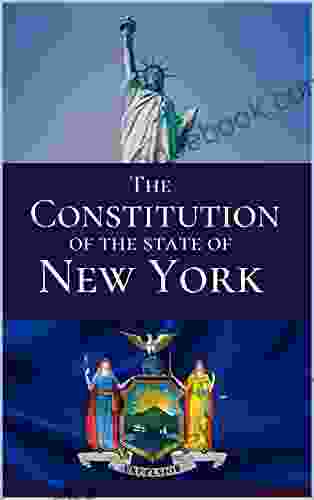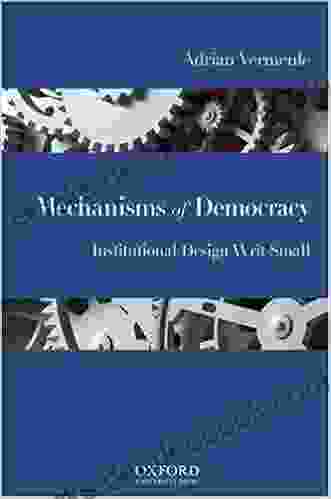Mechanisms Of Democracy: Institutional Design Writ Small

Democracy is a system of government in which all or most adult citizens have the right to participate equally in the political process. This participation can take many forms, including voting, running for office, and serving on juries. Democracy is founded on the idea that all citizens are equal and have the right to shape their own government.
4 out of 5
| Language | : | English |
| File size | : | 2249 KB |
| Text-to-Speech | : | Enabled |
| Screen Reader | : | Supported |
| Word Wise | : | Enabled |
| Print length | : | 272 pages |
| Lending | : | Enabled |
| X-Ray for textbooks | : | Enabled |
The mechanisms of democracy are the institutions and processes that allow citizens to participate in the political process. These mechanisms include:
- Elections: Elections are the most common way for citizens to participate in the political process. In an election, citizens vote for candidates who they believe will represent their interests in government.
- Political parties: Political parties are organizations that bring together like-minded citizens to support candidates and promote their policies.
- Interest groups: Interest groups are organizations that represent the interests of particular groups of citizens, such as labor unions, environmental groups, and business associations.
- The media: The media plays a vital role in democracy by providing information to citizens about the political process and candidates.
The institutional design of democracy can have a significant impact on democratic outcomes. For example, the way that elections are conducted can affect who is elected to office. The way that political parties are organized can affect how they represent the interests of their members. The way that interest groups are regulated can affect how they influence the political process. And the way that the media is regulated can affect what information citizens have access to.
Therefore, it is important to carefully consider the institutional design of democracy when creating or reforming democratic institutions. The goal should be to create institutions that promote democratic values, such as equality, participation, and accountability.
How Institutions Can Shape Democratic Outcomes
Institutions can shape democratic outcomes in a number of ways. For example, they can:
- Determine who has the right to participate in the political process: Some institutions, such as property requirements for voting, can limit who is able to participate in the political process. This can have a significant impact on the outcomes of elections and other democratic processes.
- Shape the way that citizens make decisions: Institutions can also shape the way that citizens make decisions. For example, the way that elections are conducted can affect who is elected to office. The way that political parties are organized can affect how they represent the interests of their members. And the way that interest groups are regulated can affect how they influence the political process.
- Create incentives for certain types of behavior: Institutions can also create incentives for certain types of behavior. For example, institutions that reward politicians for winning elections may encourage them to engage in negative campaigning or other unethical behavior. Institutions that reward interest groups for lobbying may encourage them to spend more time lobbying and less time representing the interests of their members.
It is important to be aware of the ways that institutions can shape democratic outcomes. By understanding these mechanisms, we can create institutions that promote democratic values and help to ensure that democracy is responsive to the needs of all citizens.
How Institutions Can Be Designed to Promote or Hinder Democratic Values
Institutions can be designed to promote or hinder democratic values. For example, institutions that are designed to be:
- Inclusive: Institutions that are inclusive allow all citizens to participate in the political process, regardless of their race, gender, income, or other factors. This helps to ensure that democracy is responsive to the needs of all citizens.
- Participatory: Institutions that are participatory allow citizens to have a say in the decisions that affect their lives. This helps to ensure that democracy is responsive to the will of the people.
- Accountable: Institutions that are accountable ensure that politicians and other public officials are answerable to the people. This helps to prevent corruption and abuse of power.
On the other hand, institutions that are designed to be:
- Exclusive: Institutions that are exclusive limit who is able to participate in the political process. This can lead to a government that is not responsive to the needs of all citizens.
- Elitist: Institutions that are elitist give more power to a small group of people. This can lead to a government that is not representative of the people.
- Unaccountable: Institutions that are unaccountable allow politicians and other public officials to act without fear of consequences. This can lead to corruption and abuse of power.
It is important to carefully consider the design of democratic institutions. The goal should be to create institutions that promote democratic values and help to ensure that democracy is responsive to the needs of all citizens.
The mechanisms of democracy are the institutions and processes that allow citizens to participate in the political process. These mechanisms can play a significant role in shaping democratic outcomes. Therefore, it is important to carefully consider the institutional design of democracy when creating or reforming democratic institutions. The goal should be to create institutions that promote democratic values, such as equality, participation, and accountability.
4 out of 5
| Language | : | English |
| File size | : | 2249 KB |
| Text-to-Speech | : | Enabled |
| Screen Reader | : | Supported |
| Word Wise | : | Enabled |
| Print length | : | 272 pages |
| Lending | : | Enabled |
| X-Ray for textbooks | : | Enabled |
Do you want to contribute by writing guest posts on this blog?
Please contact us and send us a resume of previous articles that you have written.
 Book
Book Novel
Novel Text
Text Genre
Genre Paperback
Paperback Newspaper
Newspaper Paragraph
Paragraph Sentence
Sentence Bookmark
Bookmark Synopsis
Synopsis Footnote
Footnote Scroll
Scroll Codex
Codex Bestseller
Bestseller Classics
Classics Library card
Library card Narrative
Narrative Autobiography
Autobiography Reference
Reference Encyclopedia
Encyclopedia Dictionary
Dictionary Thesaurus
Thesaurus Character
Character Librarian
Librarian Catalog
Catalog Card Catalog
Card Catalog Archives
Archives Periodicals
Periodicals Research
Research Reserve
Reserve Academic
Academic Journals
Journals Rare Books
Rare Books Interlibrary
Interlibrary Literacy
Literacy Dissertation
Dissertation Storytelling
Storytelling Awards
Awards Book Club
Book Club Textbooks
Textbooks Daniel Abreu De Queiroz
Daniel Abreu De Queiroz Gayle Trotter
Gayle Trotter Roberto Sampaolesi
Roberto Sampaolesi Roy R Luna
Roy R Luna Sarah Lark
Sarah Lark Meaghan Mcisaac
Meaghan Mcisaac Jodi Thomas
Jodi Thomas Ian Lendler
Ian Lendler Sebastien Cosson
Sebastien Cosson Heather Fowler Salamini
Heather Fowler Salamini Madeline Ffitch
Madeline Ffitch Nowick Gray
Nowick Gray Barbara Taylor Bradford
Barbara Taylor Bradford Mario Sergio Cortella
Mario Sergio Cortella Lichelle Slater
Lichelle Slater Clara Meath
Clara Meath Dana C Childress
Dana C Childress Kathy Joy
Kathy Joy Melanie Simms
Melanie Simms Stephen B Kaplan
Stephen B Kaplan
Light bulbAdvertise smarter! Our strategic ad space ensures maximum exposure. Reserve your spot today!

 Isaias BlairA Comprehensive Manual of Shoemaking and the Production of Leather and Rubber...
Isaias BlairA Comprehensive Manual of Shoemaking and the Production of Leather and Rubber... Italo CalvinoFollow ·14.5k
Italo CalvinoFollow ·14.5k Hank MitchellFollow ·8.7k
Hank MitchellFollow ·8.7k Joe SimmonsFollow ·19.9k
Joe SimmonsFollow ·19.9k Jeffrey HayesFollow ·3.8k
Jeffrey HayesFollow ·3.8k Seth HayesFollow ·2.1k
Seth HayesFollow ·2.1k Devon MitchellFollow ·17.8k
Devon MitchellFollow ·17.8k Ike BellFollow ·10.4k
Ike BellFollow ·10.4k Joshua ReedFollow ·6.8k
Joshua ReedFollow ·6.8k

 Amir Simmons
Amir SimmonsMore Zeal Than Discretion: A Closer Look at the Risks and...
Enthusiasm is often seen as a positive...

 Wayne Carter
Wayne CarterYear of the Dog: American Poets Continuum 178
Year of the Dog is a...

 David Foster Wallace
David Foster WallaceThe Constitution of the State of New York: A...
The Constitution of the...

 Harvey Bell
Harvey BellSmall Cetaceans of Japan: Exploitation and Biology
Small cetaceans, including...

 Blake Bell
Blake BellEffortless Elegance: A Comprehensive Guide to Captivating...
In the realm of crocheting,...
4 out of 5
| Language | : | English |
| File size | : | 2249 KB |
| Text-to-Speech | : | Enabled |
| Screen Reader | : | Supported |
| Word Wise | : | Enabled |
| Print length | : | 272 pages |
| Lending | : | Enabled |
| X-Ray for textbooks | : | Enabled |












